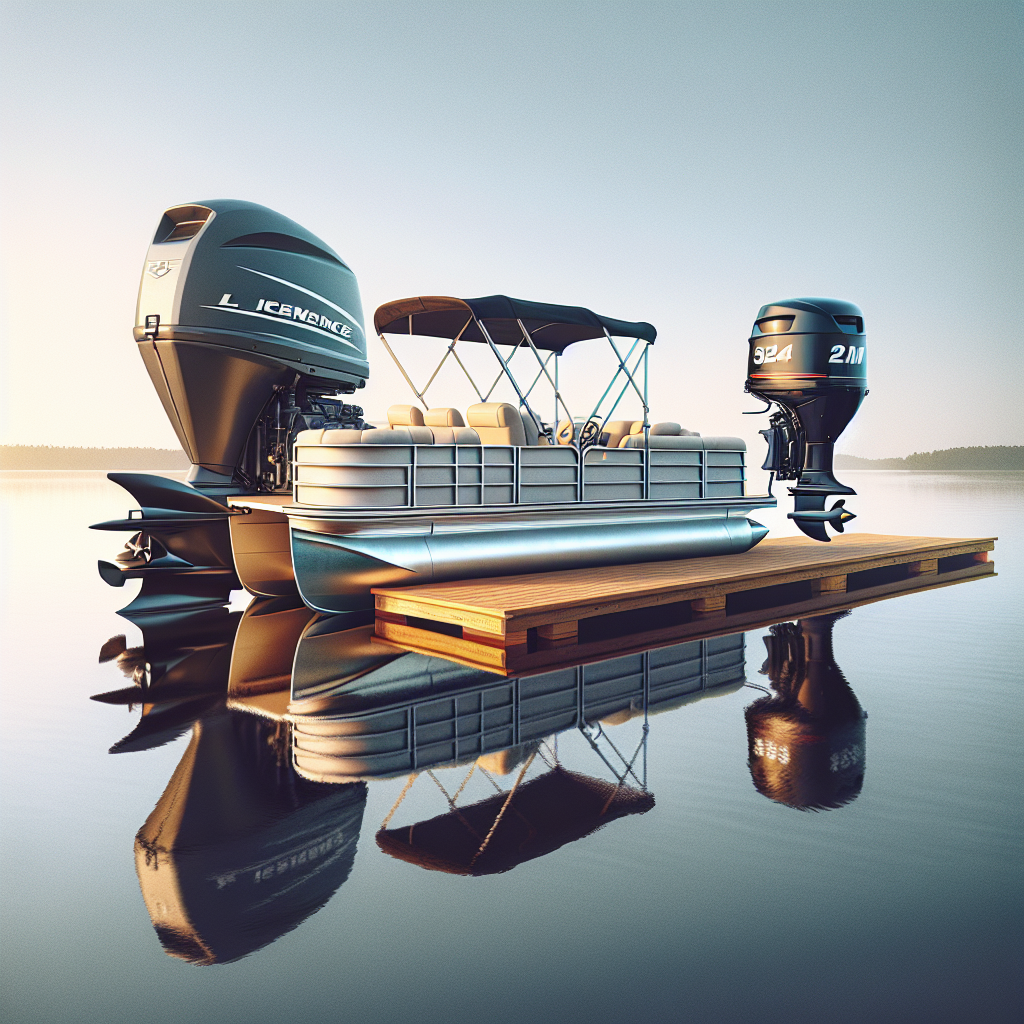Introduction to Pontoon Boats and Motor Sizing
A pontoon boat is a popular type of boat with a flat deck, two or three pontoons, and ample space to accommodate a large number of passengers or cargo. However, choosing the right motor size is critical to ensure optimum performance, fuel efficiency, and safety. This article will provide insights and recommendations to help you choose the perfect motor size for your pontoon boat.
Importance of Choosing the Right Motor Size
The motor size is a crucial factor in determining how well your pontoon boat will perform, how much fuel it will consume, and how safe it will be on the water. An oversized motor can lead to excessive fuel consumption, instability, and other safety hazards, while an undersized one will struggle to propel the boat, leading to poor performance and handling.
Overview of Pontoon Boat Characteristics
Pontoon boats have unique characteristics that affect motor sizing, such as size, weight, payload, deck configuration, and hull design. Understanding these features is essential to determine the right motor size for your specific needs.
Factors Affecting Motor Size Selection
Choosing the right motor size depends on various factors, such as intended usage pattern, speed requirements, water conditions, budget, and environmental concerns. Evaluating these factors carefully can help you narrow down your options and select the most appropriate motor for your pontoon boat.
Understanding the Basics of Boat Motors
Types of Motors for Pontoon Boats
Before choosing a motor size, it’s essential to understand the different types of motors available for pontoon boats.
The common types of motors include:
- Outboard Motors: The most popular type of motor for pontoon boats. These engines are attached to the transom of the boat and are ideal for both freshwater and saltwater.
- Inboard Motors: These are engines enclosed within the hull of the boat. They are best suited for larger pontoon boats due to their weight and size.
- Stern Drive: These motors combine the features of both outboard and inboard motors. They are used for high-performance boats and require regular maintenance.
Horsepower (HP) Explained
Understanding horsepower is crucial when selecting the right motor for your pontoon boat. Horsepower is the power output of the engine, i.e., the horsepower rating shows how powerful the motor is.
The higher the horsepower rating, the more powerful the motor will be. A higher horsepower rating typically means faster speeds, but it comes at a price. High horsepower engines consume more fuel and are more expensive to maintain.
It’s crucial to find a balance between speed and affordability. You should also consider the weight and capacity of your boat before selecting the horsepower rating.
The Relationship Between Motor Size and Boat Performance
Motor size affects the overall performance of the pontoon boat. The motor size should be proportional to the weight and capacity of your boat.
A motor that is too small won’t effectively propel the boat, while a motor that is too large will consume more fuel and weight. Manufacturers provide a range of recommended motor sizes for each boat model, considering the size, weight, and intended use of the boat.
When choosing a motor, you should consider factors such as the size of the boat, the number of passengers, and the frequency of use. Choosing the right motor size will result in optimal performance, fuel efficiency, and longevity of the motor.
Determining the Right Motor Size for Your Needs
When it comes to choosing the right motor size for your pontoon boat, several factors need to be considered. Below are some key considerations to make an informed decision:
A. Evaluating Pontoon Boat Usage and Requirements
- What do you plan on using your pontoon boat?
- What is the weight capacity of your pontoon boat?
- Will you be carrying a lot of people or equipment?
- How often do you use your boat?
Answering these questions will help you determine the ideal horsepower for your pontoon boat. For example, a pontoon boat used solely for leisurely cruises with a small group of people can typically use a smaller motor compared to a pontoon boat used for water sports or fishing. The weight capacity and maximum load will also determine what motor size can safely handle the weight.
B. Manufacturer Recommendations and Regulations
It’s important to follow the manufacturer recommendations for motor size for your specific pontoon boat model. These recommendations are based on the boat’s size, weight, and maximum load. Additionally, there may be state or federal regulations on motor size and horsepower based on the body of water you plan on boating on. Make sure to research any regulations before making a final decision on motor size.
C. How to Calculate the Ideal Horsepower for Your Pontoon Boat
Calculating the ideal horsepower for your pontoon boat involves knowing the weight capacity, maximum load, and pontoon boat length. A general rule of thumb is to have 2-3 horsepower for every 100 pounds of weight capacity, but it ultimately depends on your specific pontoon boat model. For maximum efficiency, make sure not to exceed the recommended horsepower.
D. Considering the Weight and Capacity of Your Boat
It’s important to consider the weight and capacity of your pontoon boat when deciding on a motor size. A motor that is too small will struggle to perform and may even damage the boat, while a motor that is too large will not be efficient and can cause safety issues. Always make sure to balance your pontoon boat’s weight and capacity with the horsepower of the motor.
Pros and Cons of Different Motor Sizes
A. Benefits of Choosing a Larger Motor Size
When it comes to choosing a motor size for your pontoon boat, opting for a larger one can offer several benefits. Firstly, it can provide increased acceleration, allowing you to reach your desired speed faster. Additionally, larger motors tend to perform better when powering heavier boats or navigating rough waters, providing more stability and control. Finally, if you plan on using your pontoon boat for water sports activities, a larger motor can provide the extra power needed to tow skiers or wakeboarders.
B. Drawbacks of Oversizing Your Motor
While choosing a larger motor for your pontoon boat can have its advantages, it’s important to consider the potential drawbacks as well. One major issue is fuel consumption, as larger motors tend to burn through more gas than smaller ones. Additionally, larger motors can be more expensive to purchase and maintain, adding to the overall cost of boat ownership. It’s also important to note that oversizing your motor can lead to safety issues if you are not familiar with handling the extra power, or if your boat is not designed to withstand the added stress.
C. Advantages of Smaller, More Efficient Motors
If fuel efficiency and overall cost are a priority for you, choosing a smaller, more efficient motor may be a better option. These motors usually cost less to purchase and maintain, while still providing adequate power to navigate calm waters or carry a lighter load. They can also provide a smoother and quieter ride, as they produce less vibration and noise compared to larger motors.
D. Balancing Power, Efficiency, Cost, and Environmental Impact
Ultimately, when it comes to choosing the right motor size for your pontoon boat, it’s all about finding the right balance between power, efficiency, cost, and environmental impact. Consider your boating needs, usage, and budget, as well as any regulations or restrictions in your area. It’s also important to keep in mind the environmental impact of your motor, opting for a more eco-friendly option when possible.
| Motor Size | Benefits and Drawbacks |
|---|---|
| Larger Motor |
|
| Smaller, Efficient Motor |
|
Maintenance, Legal, and Safety Considerations
A. Importance of Regular Motor Maintenance for Safety and Performance
Regular maintenance of your pontoon boat motor is essential to ensure that it operates safely and efficiently. Neglecting to maintain your motor can cause it to run poorly and even fail, putting you and your passengers at risk. Some routine maintenance tasks you should perform include changing the oil and filters, inspecting the spark plugs, and lubricating the motor’s moving parts.
B. Navigating Legal Requirements for Motor Size
When it comes to selecting a motor size for your pontoon boat, it’s essential to take local laws and regulations into account. Many states and municipalities have specific rules regarding the maximum horsepower that a boat can have. Be sure to check with your local boating authorities to ensure that you are compliant with these regulations.
C. Safety Tips Related to Motor Size on Pontoon Boats
Using a motor that is too large or small for your pontoon boat can be dangerous and could compromise the safety of your passengers. Motors that are too big can cause the boat to exceed its weight limit and make it more difficult to handle. On the other hand, motors that are too small can cause the boat to struggle to get up on plane, making it less stable. It’s essential to select a motor that is appropriately sized for your boat and to follow all safety guidelines related to your motor size.
D. Upgrading or Replacing Your Pontoon Boat Motor
If your pontoon boat motor is outdated or no longer meets your needs, upgrading or replacing it may be necessary. When considering an upgrade or replacement, be sure to take into account the horsepower, weight, and efficiency of the motor. You should also consider whether the new motor meets any legal requirements in your area.
FAQs
- Q: What is a good size motor for my pontoon boat?
- Q: What maintenance tasks do I need to perform on my pontoon boat motor?
- Q: How do I know if my motor is too big or too small for my pontoon boat?
A: The size of your pontoon boat motor depends on various factors, such as the weight and capacity of the boat, and how you plan to use it. It’s best to consult the manufacturer’s recommendations or speak to a boating expert to determine the best size motor for your specific needs.
A: Regular maintenance tasks for pontoon boat motors include changing the oil and filters, inspecting the spark plugs, and lubricating moving parts.
A: A motor that is too large for your pontoon boat can cause it to exceed its weight limit and make it more difficult to maneuver. Conversely, a motor that is too small can cause the boat to struggle to get up on plane, making it less stable.






